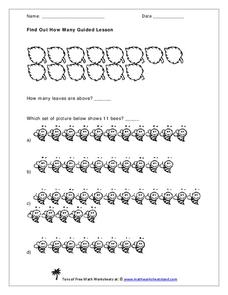DK Publishing
Number Sentences Multiplying by 3
How many sets of eggs? Approach multiplication through sets of, in this case, three objects. Learners fill in blanks to complete a number sentence in two forms: ___ sets of 3= ___ and ___ x ___ = ___. There is an example they can...
Curated OER
Multiplication as Repeated Addition
For beginners, present multiplication as repeated addition to give them a familiar context. They examine grouped sets of objects and add up the groups to get a total. Then, learners translate the addition sets to a basic multiplication...
Curated OER
Finding 10s
For beginners to addition, sets of objects are the ideal way to make this concept understandable. For each of these sets they ring 10 and count the remaining. Then, scholars fill in the addends as 10 and the remaining number. The sums...
Curated OER
Counting: Connecting Pictures and Numbers
As young scholars begin connecting numbers with values, help them grasp this concept with sets of objects like these. They examine five sets (up to 15 in number) and match each to a corresponding digit. Then, they draw a set of their own...
Curated OER
How Many?
Do this as a whole-class activity by projecting this simple counting activity. Learners count a set of 14 leaves, recording the total number. Then, they examine four sets of bees and indicate which one shows 11. This can be done...
Curated OER
Compare Sets of Objects Guided Lesson
Practice math vocabulary terms fewer, more, and data using this visual-object-analysis guide. Learners observe three sets of objects and answer three questions, two of which compare numbers of objects, and the last which asks scholars to...
Other
Hubbard's Cupboard: If You Give a Mouse a Cookie
Math and literacy meet in this extensive lesson plan based on the familiar children's story, "If You Give a Mouse a Cookie." Learners will be engaged in math activities such as, "Cookie Count," "Who Took the Cookies," and "Cookie Jar...








